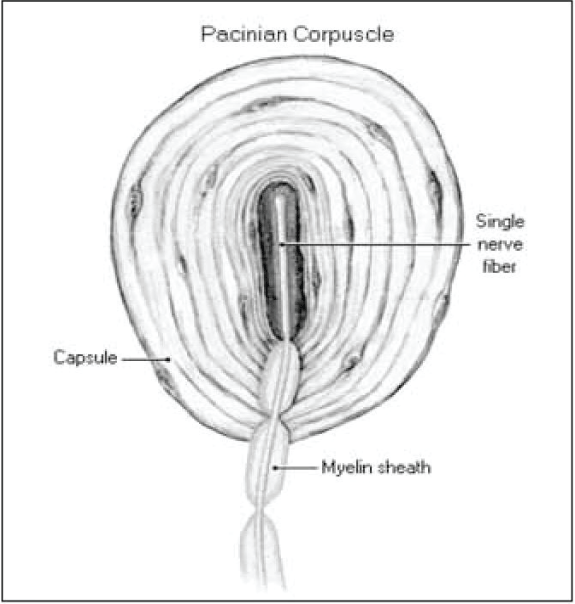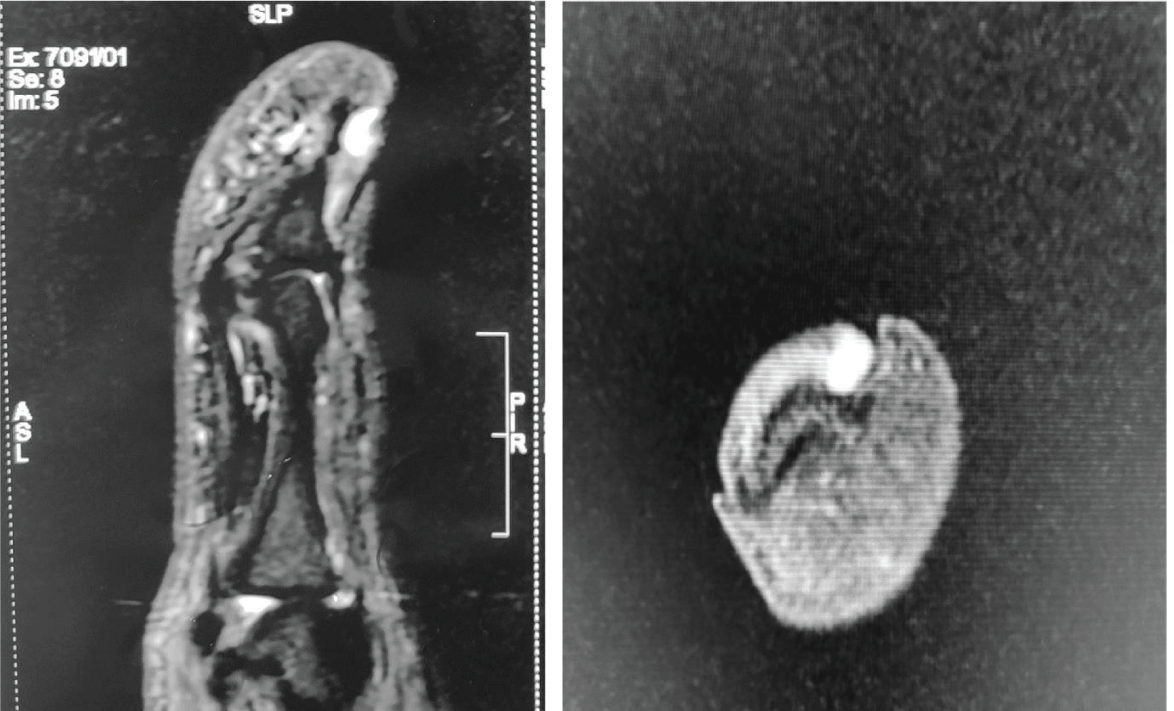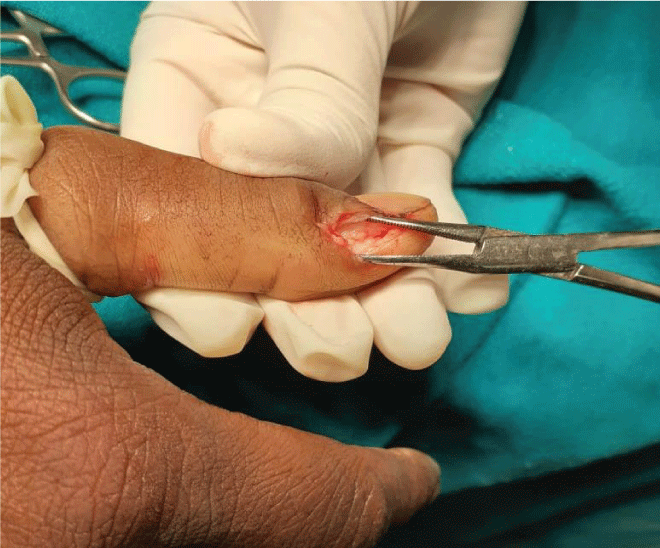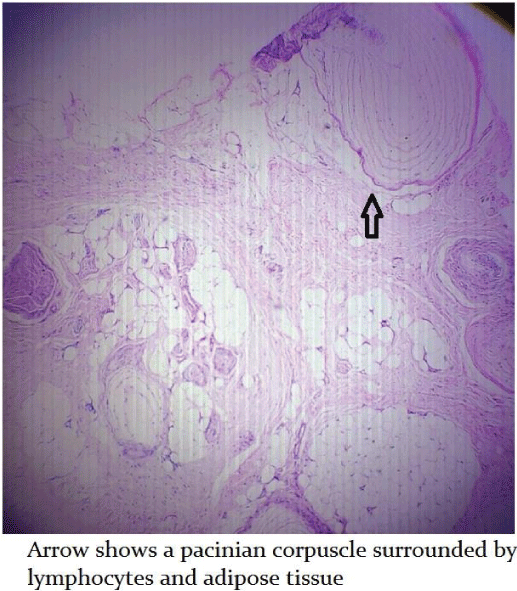Open Journal of Orthopedics and Rheumatology
Pacinian corpuscle neuroma: A rare case report with review of Literature
Sujit Kumar Singh1*, Umesh Yadav2, Ajay Sheoran2, RC Siwach3, Ashish Devgan3, Kshitish Chandra Behera4, Amandeep Verma1, Karunesh Ranjan1 and Surinder Jaiswal5
2Assistant Professor, Department of Orthopedics, Pt. BD Sharma PGIMS, Rohtak
3Senior Professor, Department of Orthopedics, Pt. BD Sharma PGIMS, Rohtak
4Senior Resident, Department of Orthopedics, Pt. BD Sharma PGIMS, Rohtak
5Junior Resident, Department of Orthopaedics, Pt. B.D. Sharma PGIMS, Rohtak
Cite this as
Singh SK, Yadav U, Sheoran A, Siwach RC, Devgan A, et al. (2020) Pacinian corpuscle neuroma: A rare case report with review of Literature. Open J Orthop Rheumatol 5(1): 034-036. DOI: 10.17352/ojor.000024The authors discuss an interesting case of a Pacinian corpuscle neuroma in the finger of a young woman who presented with severe digital pain. The clinical signs were very prominent. The patient had complete pain relief following excision of the tumor. Pacinian corpuscle neuromas are rare, with only about few cases reported in the literature. The histology, presenting features and associated conditions are discussed in detail. In addition to a neuroma or glomus tumor, Pacinian corpuscle hyperplasia should be considered in the differential diagnosis of digital or palmar pain of unknown etiology.
Introduction
Neural tumours composed exclusively of Pacinian corpuscles or showing focal Pacinian differentiation are extremely rare and have only occasionally been reported in the literature. Pacinian corpuscles are mechanoreceptors found in man and other animals. They are distributed in the dermis from the fingers and palm of the hand, the conjunctiva, near joints, in the mesenteries, branching blood vessels, penis, urethra, clitoris, parietal peritoneum and loose connective tissue. The Pacinian corpuscle is a pressure receptor that responds to high-frequency vibratory stimuli. The corpuscle is fluid filled and essentially incompressible. It consists of a single nerve fibre, the terminal region of which is enclosed in a multilaminated connective tissue capsule. The nerve is myelinated except for the terminal region within the capsule, which is nonmyelinated. The corpuscle transmits mechanical stimuli through the connective tissue lamellae and fluid, exciting the nonmyelinated receptor axon in its core (Figure 1). These end-organs are the only sensory receptors that are large enough to be identified and dissected in the anatomy laboratory. They should be looked for when dissecting the palm of the hand and fingers. There are approximately 300 Pacinian corpuscles in the hand. They are distributed in fingers (60%), near the metacarpophalangeal joints (25% to 48%) and in the thenar and hypothenar regions (8% to 18%) [1]. A neuroma may sometimes arise from this Pacinian corpuscle. We present an interesting case of a woman with Pacinian corpuscle neuroma of the thumb.
Review of literature
Pacinian corpuscle neuroma is an uncommon lesion with a limited number of cases reported. This lesion can be called variably as Pacinian corpuscle hyperplasia or Pacinian corpuscle neuroma [2-7]. The most common site of this lesion is the hand, where it presents as painful swelling. A prior history of trauma may be elicited in a majority of the patients and it may be associated with foreign body reaction [8]. Presentation may vary from digital pain to macrodactly [2-8]. Differential diagnosis of glomus tumor should always be kept in mind when disease involves the digital pulp. Similar lesions have been described in other parts of the body as well. They include Pacinian neuroma of vulva, Pacinian hyperplasia of foot, sacrococcygeal pacinioma and intraperitoneal pacinian neuroma [9-13]. Pacinian corpuscle neuromas may be associated with other lesions such as glomus tumour, Dupuytren’s contracture, multiple Pacinian neuroma and arteriovenous anastomoses [14-16].
Case presentation
A 32-year-old female patient presented to the Department of Orthopaedics with pain of right thumb since last 8 months. The pain was diffuse and severe over whole of the thumb and was even tender to light touch. There was no history of previous pain. On examination, there was normal skin and nail complex. Flexor tendons were intact with no compressibility, pulsations or thrill and no distal neurovascular deficit. A provisional diagnosis of a Glomus tumour was made. Routine blood investigations, ECG, chest X-ray, X-ray of the right hand and an MRI were done. X- ray showed normal bone architecture. MRI revealed an intensely enhancing T2 hyperintense lesion on medial aspect of nail bed suggestive of Glomus tumour (Figure 2). Based on the reports excision and biopsy of the lesion was planned. A linear incision was made on the medial aspect under local anaesthesia using 2% lignocaine and tourniquet control (Figure 3). Immediately in the subcutaneous plane, shiny clusters of mass were seen clumped together and they seemed to be under tension. All of the visible masses were excised. Primary closure was performed. The excised mass was sent for histopathological examination. Histopathological features were consistent with a Pacinian corpuscle neuroma (Figures 4,5). Postoperative period was good. Patient was discharged on the 2nd postoperative day and skin sutures were removed on the 14th postoperative day. One month hence, the patient had complete pain relief. Finger movements were near normal. Post operative period was uneventful and no recurrence was noted in post operative period.
Conclusion
When making a differential diagnosis of unexplained severe pain in the hand, Pacinian corpuscle should be considered in addition to benign tumors of non-neural origin, such as hemangiomas, fibromas, ganglion cysts, mucoid cysts and angiolipomas, and neural origin, including schwannomas and glomus tumors, as the cause of a tender digital papule. Several autoimmune diseases such as gout, exostosis, and arthritis can also present as this condition [17]. The symptoms of this disease are usually alleviated after complete resection. The definitive diagnosis and treatment of this disease are possible if surgical resection is performed after careful consideration of differential diagnoses. Any dermatologist making a differential diagnosis of unexplained severe pain in the finger must take into account Pacinian neuroma, in addition to glomus tumor and other types of painful soft-tissue tumor.
- Stark B, Carlstedt T, Hallin RG, Risling M (1998) Distribution of human Pacinian corpuscles in the hand. A cadaver study. J Hand Surg 23: 370-372. Link: https://bit.ly/3i6wqpE
- Kumar A, Darby AJ, Kelly CP (2003) Pacinian corpuscles hyperplasia – an uncommon cause of digital pain. Acta Orthop Belg 69: 74-76. Link: https://bit.ly/3g1aoDe
- Fletcher CD, Theaker JM (1989) Digital pacinian neuroma: A distinctive hyperplastic lesion. Histopathology 15: 249-256. Link: https://bit.ly/2BEbndt
- Fraitag S, Gherardi R, Wechsler J (1994) Hyperplastic pacinian corpuscles: An uncommonly encountered lesion of the hand. J Cutan Pathol 21: 457-460. Link: https://bit.ly/2VknK5E
- Patterson TJ (1956) Pacinian corpuscle neuroma of the thumb pulp. Br J Plast Surg 9: 230-231. Link: https://bit.ly/3fY0qSY
- Rhode CM, Jennings WD (1975) Pacinian corpuscle neuroma of digital nerves. South Med J 68: 86-89. Link: https://bit.ly/2Yy1kzx
- Jones NF, Eadie P (1991) Pacinian corpuscle hyperplasia in the hand. J Hand Surg 16: 865-869. Link: https://bit.ly/2BBaAtP
- Rinaldi P, Andreini A, Ercolani C, Bernardi L, Bernardi S (2000) Digital pacinian hyperplasia. Report of a case associated with foreign body reaction. Pathologica 92: 36-40. Link: https://bit.ly/3832Soo
- Satge D, Nabhan J, Nandiegou Y, Hermann B, Goburdhun J, et al. (2000) A Pacinian hyperplasia of the foot. Foot Ankle Int 22: 342-344. Link: https://bit.ly/2YBWjX0
- Dembinski AS, Jones JW (1991) Intra-abdominal pacinian neuroma: A rare lesion in an unusual location. Histopathology 19: 89-90. Link: https://bit.ly/3dBKbcu
- Guidugli Neto J (1990) Intraperitoneal pacinian neurofibroma (enlarged pacinian corpuscles). Rev Paul Med 108: 192. Link: https://bit.ly/31v33I7
- Medina Perez M, Rafel Ribas E, Valero Puerta JA, Perez Martin D (2000) Pacinian neurofibroma of the vulva. Arch Esp Urol 53: 634-636. Link: https://bit.ly/3fWS2mL
- Bale PM (1980) Sacrococcygeal paciniomas. Pathology 12: 231-235. Link: https://bit.ly/3dBYPkf
- Akyurek N, Ataoglu O, Cenetoglu S, Ozmen S, Cavusoglu T, et al. (2000) Pacinian corpuscle hyperplasia coexisting with Dupuytren’s contracture. Ann Plast Surg 45: 220-222. Link: https://bit.ly/2NsX3r1
- Levi L, Curri SB (1980) Multiple Pacinian neurofibroma and relationship with the finger-tip arterio-venous anastomoses. Br J Dermatol 102: 345-349. Link: https://bit.ly/3eDzszC
- Greider JL, Flatt AE (1982) Glomus tumor associated with pacinian hyperplasia – case report. J Hand Surg 7: 113-117. Link: https://bit.ly/384GStb
- Kim SW, Jung SN (2011) Glomus tumor within digital nerve: a case report. J Plast Reconstr Aesthet Surg 64: 958-960. Link: https://www.jprasurg.com/article/S1748-6815(10)00677-7/pdf
Article Alerts
Subscribe to our articles alerts and stay tuned.
 This work is licensed under a Creative Commons Attribution 4.0 International License.
This work is licensed under a Creative Commons Attribution 4.0 International License.





 Save to Mendeley
Save to Mendeley
